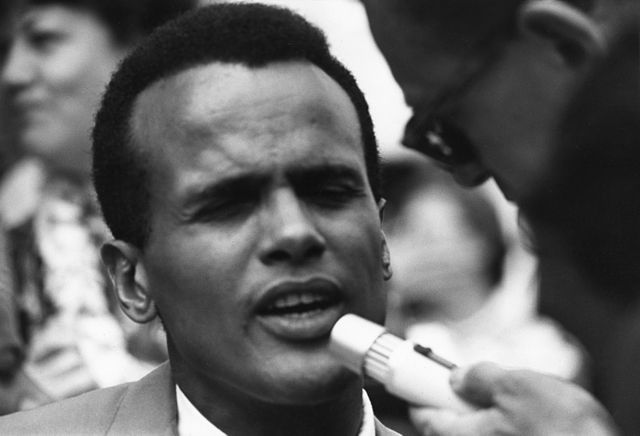
By Nicole D. Batey, Special to the AFRO
Civil rights leaders and organizations across the country are reflecting on the life of civil rights icon, singer and actor Harry Belafonte Jr. The 96-year old Belafonte died on April 25 morning of congestive heart failure. He is most remembered for using his talent and time in the spotlight to fight for social justice at the height of the Civil Rights Movement.
Rev. Kobi Little, president of the Baltimore City NAACP, told the AFRO that “Harry Belafonte had a life well-lived.”
“We can only aspire to live as well as him, to have a positive impact on both culture and society. His support of the civil rights movement is a model for other entertainers and celebrities. We need more of their investment in making a difference to advance justice and equity for people of color,” said Little. “We need others to help continue his legacy by getting more involved in social activism and building equity, so that his work and the works of others like Denzel Washington, Oprah Winfrey, and LeBron James become the norm and not considered the exceptions in the advancement and sustainability of our communities.”
Reverend Al Sharpton, founder and president of the National Action Network (NAN) said “Harry Belafonte was a true mentor and friend,” in a statement sent out shortly after news of Belafonte’s death.
“I am heartbroken to hear of his death but inspired by the long, fruitful life he led. He realized his platform gave him the ability to affect change. He used it to advance the civil rights movement and get others in his position off the sidelines,” said Sharpton. “I cherished the time he would give me and others to both guide and correct us. He was a culture-changing entertainer, a history-changing activist, and an unmatchable intellectual. Rest in peace and power, Mr. B.”
Since 1991, National Action Network (NAN) has worked within the spirit and tradition of Dr. Martin Luther King Jr. to promote a modern civil rights agenda that includes the fight for one standard of justice, decency and equal opportunities for all people regardless of race, religion, nationality or gender.
“The passing of civil rights icon Harry Belafonte leaves a devastating void in the racial justice community. Before his rise, no entertainer had ever used the platform and resources his fame afforded him to accomplish so much,” stated Marc H. Morial, National Urban League President and CEO in a message sent out to the press. “His personal and financial support was critical to every major event of the Civil Rights Movement, from the Freedom Rides and the Birmingham Campaign to the March on Washington and the Freedom Summer of voter registration. Every American who works for racial justice takes inspiration from his unwavering commitment.”
Morial reflected on how Belafonte put his own life on the line for what he believed.
“He faced down threats to his career, having been blacklisted during the McCarthy Era, and threats to his life, notably when he and Sydney Poitier were chased by Klansmen while delivering contributions to voting rights activists in Mississippi,” recalled Morial. “It was an honor and a privilege to know him. The National Urban League and the Urban League Movement will cherish his memory and strive to honor his legacy.”
In response to the death of the award-winning singer, actor, and civil rights activist, the Southern Poverty Law Center (SPLC) stated:
“Harry Belafonte was a passionate civil rights icon whose contributions through the arts continue to inspire our fight for the freedom and liberation of Black and Brown people today. A strong supporter of Martin Luther King, Jr., Mr. Belafonte used his celebrity to quietly underwrite the civil rights movement. When necessary, he solicited famous friends and even financed the movement himself—paying bail money and hospital bills and organizing a committee that raised $50,000 to continue the Birmingham Campaign after Dr. King’s arrest. Belafonte’s activism extended beyond the United States as he fought against apartheid alongside Nelson Mandela and Miriam Makeba, campaigned for Mandela’s release from jail, and advocated for famine relief in Africa.”
“The SPLC mourns the passing of Harry Belafonte, Jr., the epitome of a servant leader with an unwavering commitment to social justice worldwide. Our hearts are with Mr. Belafonte’s family and loved ones. In his honor, we will continue the march toward equity, justice, and liberation for all.”
Belafonte’s death reverberated with the highest elected officials in the land, with even President Joe Biden speaking on the life and legacy of the civil rights and social justice warrior.
“Harry Belafonte was born to Caribbean parents in Harlem, N.Y. on March 1, 1927, when segregation was the order of American society. To our nation’s benefit, Harry never accepted those false narratives and unjust boundaries. He dedicated his entire life to breaking barriers and bridging divides,” said Biden, in a statement issued the same day as Belafonte’s passing.
“As a young man motivated to find his purpose, he became mesmerized by theater when he saw a performance of the American Negro Theater in Manhattan. As one of America’s original breakthrough singers and performers, he would go on to garner a storehouse of firsts—the first Black matinee idol, the first recording artist to sell over a million records, the first Black male Broadway actor to win a Tony award, the first Black producer to win an Emmy award, and one of the highest paid entertainers of his time, among other accolades,” continued Biden.
“Harry Belafonte’s accomplishments are legendary and his legacy of outspoken advocacy, compassion, and respect for human dignity will endure. He will be remembered as a great American.”

